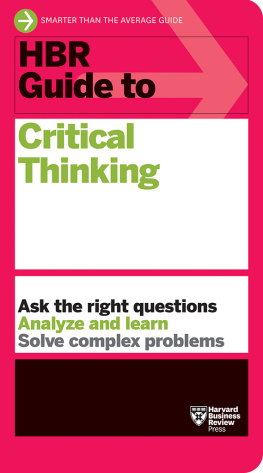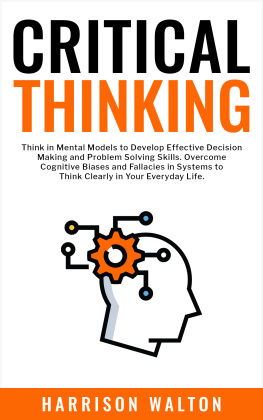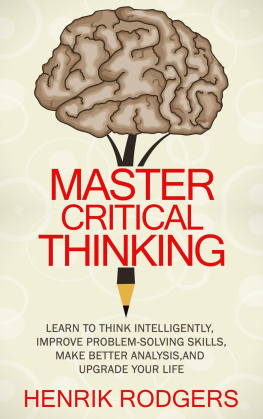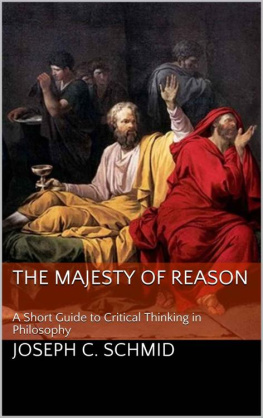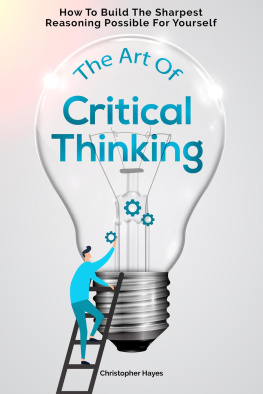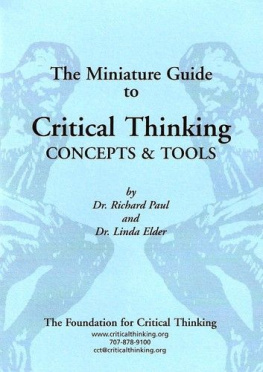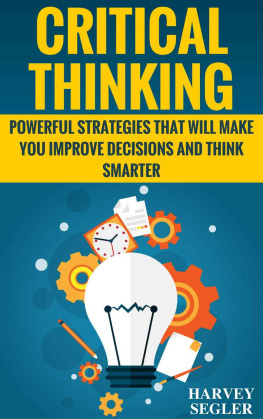Copyright 2021 by Faruk Rahmanovic
All rights reserved
Editors:
Michael Owens, M.Ed.
Steven Starke, Ph.D.
Nicholas Dovellos, Ph.D.
Designer:
Kristen Thorley
For Majda and Sufian
INTRODUCTION
If you take a programming class and read a book on programming, you expect to be able to program at the end of it. If you take a math class and read a book about mathematics, you expect to be able to do that kind of math at the end of it or at least do it better than when you started. This is a book on critical thinking. So, by the end of it, you should expect to be a critical thinker.
So, what exactly is critical thinking?
Critical thinking is an intellectual skill used to examine ideas, and to do so in a way that gives us a clear, concise, transparent, and meaningful conclusion about whether the idea works, or whether it is garbage.
Why is critical thinking important? Or, if you prefer , why should you spend both the money to buy the book, the time to read and understand it, and then the effort to use this skill?
Lets use an example I like to give to my students on day 1 of teaching a class on critical thinking (going through this book is the equivalent of taking that class):
You should care about this class, and put in the right kind of effort, because this is the most important class you can take.
That is a very big claim, especially for people that are not into philosophy and are commonly only there for a general education requirement. How can I defend that idea?
Philosophy (and critical thinking in particular) is all about how to think; how to properly use your reason to understand the world around you and to navigate your way through it. Every field of interest and study ever invented (yes, even Interpretive Dance), is based on thinking and the use of reason. That means that, if you can learn how to think and use your reason better, you can be better at every single thing you do. Every part of your life - academic, professional, personal, etc. can be made better if you understand critical thinking. Therefore, this one skill can have positive effects on everything you do for the rest of your life. Is there another skill you could pursue that makes a claim like that? No. Every other skill gives you ideas and practices you can use in some particular field. Only philosophy makes this kind of claim for every aspect of your life.
Critical thinking allows you to use reason better. Therefore, if you put in the effort and properly understand and use this skill, it will help you make better decisions for anything you do, for the rest of your life. This is why a book like this represents the most important skill you can learn; because it teaches you a single skill that translates into making meaningfully better decisions everywhere and all the time - no matter the context. So, the reason why you should invest money, time, and effort into this skill is because this skill will help you with every other issue you face and interest you have.
The goal of this book is to teach you critical thinking skills, from the ground up. By the end of this book, you will be able to understand why each part of the process is important, and how to best use it for your own needs.
How was this text developed?
When I started teaching philosophy, I ran into a bit of a problem: all the critical thinking textbooks I examined lacked a clear methodology for critical thinking. They told the reader to think harder but failed to explain what exactly that means. They told the reader to get the context, without explaining how to do so, or how to recognize that they dont have enough context. There was a lot of jargon, but it didnt really contribute to the understanding of the skill for students.
On top of that, I found out that most students lacked critical thinking skills; the few students who did have a grasp on it still did not have a systematic way of using that skill. As a result, they spent a lot more time and effort in making it work than was necessary. Fact of the matter is, when a skill is difficult, we tend to skip using it, unless we absolutely have to. If you can cook, but its very difficult and time-consuming, then you likely dont cook unless you have no other choice. Find an expert at cooking, and youll find someone who cooks for fun - because the skill is second nature to them.
This was equally true everywhere I went: high schools, community colleges, major 4-year institutions, even the exclusive Honors Colleges filled with pre-med students. That means that this is not an issue of quality of your high school or college, but a general issue we all face. For example, the biggest hurdle on the MCAT for many students is not the science part, but the critical thinking portion. Thats because, unlike the science part - for which they spent years preparing - they have had no meaningful training in critical thinking. To make sure that my students were getting the best education I could provide, I started writing my own content for them.
Around the same time, I had the opportunity to talk to an expert on cybersecurity and a CISO (chief information security officer) for a Fortune 500 company. When I explained the method I had developed for critical thinking, they were impressed enough to invite me to present it to their team as a better way of doing cybersecurity analysis. Now, a disclaimer: I know nothing about cybersecurity; I cannot code my way out of a wet paper bag. That means that all I could present was philosophy and critical thinking. All I could offer was a way to think better, in a clear, concise, and transparent way - in order to solve any problem, in any field . The only thing related to cybersecurity in my presentation was the case study and a few examples. But the presentation could be exactly the same for any field at all.
The presentation was a hit, and I was invited to present again at a national conference - where the Claim Shredder Method was adopted as standard procedure for the cybersecurity analysts. Following that, I presented it to an international community of cybersecurity analysts, who also adopted it. And again, I dont know the first thing about cybersecurity. The entire presentation was nothing more than content I had developed for my critical thinking courses.
Ultimately, this book is the long form of that presentation. It walks you through all the key components of critical thinking - making sure you understand not only what to do, but why youre doing it. Additionally, the Claim Shredder Method avoids the problems of the other critical thinking textbooks, by giving you a very clear process to follow. This gives you a how-to component to the course. As I had started teaching, I also noticed that many of my students viewed philosophy and critical thinking as something strictly Western - a product of Europe in the last few hundred years. Given my extensive academic background in non-Western culture and philosophy, and my personal experiences (Sarajevo has been a melting pot of East and West for the last 600 years), it seemed rather strange that the use of reason to comprehend and solve problems should be viewed as somehow a feature of only one small part of the world.


